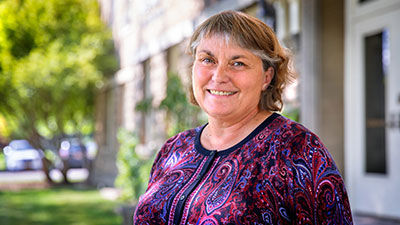Deborah Grantham Named Director of Northeastern IPM Center

Deborah Grantham has been named director of the Northeastern Integrated Pest Management (IPM) Center, effective September 16.
The Center fosters the development and adoption of integrated pest management, a science-based approach to dealing with pests that weighs economic, environmental, and human-health considerations. While the Center and its staff are located at Cornell in the College of Agriculture and Life Sciences, its responsibilities and scope extend throughout the northeastern United States. It is one of four regional IPM centers supported by the USDA National Institute of Food and Agriculture that jointly promote and support IPM initiatives for the entire country.
As director, Grantham will provide strategic leadership for the center and work closely with its advisory council, state IPM programs, and IPM working groups comprising experts and stakeholders throughout the Northeast.
As director, Grantham will provide strategic leadership for the Center and work closely with its advisory council, state IPM programs, and IPM working groups comprising experts and stakeholders throughout the Northeast.
"I am honored and very excited about assuming the role of director. The Center has a vibrant history, an outstanding staff, and a tremendous network regionally and nationally. I look forward to advancing its mission," said Grantham.
"I am honored and very excited about assuming the role of director. The center has a vibrant history, an outstanding staff, and a tremendous network regionally and nationally. I look forward to advancing its mission."
Deborah Grantham
Director
Northeastern IPM Center
She comes to the Center after 25 years with Cornell Cooperative Extension, most recently as assistant director for environment and natural resources. She has conducted research and spearheaded outreach initiatives that intersect broadly with goals and principles of IPM.
"Integrated pest management crosses disciplines and audiences and encompasses a range of human activities and environments, urban through rural," continued Grantham. "It is imperative that we step outside of our silos and recognize the need to broaden approaches and partnerships. The Northeastern IPM Center is well positioned to promote interdisciplinary collaborations and approaches that serve the region widely and comprehensively."
Mike Hoffmann, executive director of the Cornell Institute for Climate Smart Solutions and professor of entomology, served as interim director of the Center for much of the past year and assumed a lead role in the search for a new permanent director.
"We are thrilled to have Deb in this role. She has experience in Cooperative Extension, is familiar with the region, and is eager to take the helm of the Center with its region-wide impact," said Hoffmann.
"Today, more than ever, we need to approach the management of pests at a regional level, and that is what the Center does well."
Mike Hoffmann
Former Interim Director
Northeastern IPM Center
Hoffmann was director of the New York State IPM Program from 1999 to 2005 and as an entomologist has been involved in IPM research for decades. He also serves on the Center's steering committee.
"Today, more than ever, we need to approach the management of pests at a regional level, and that is what the Center does well. Through its grants program, it supports a variety of research and extension activities that involve multiple states," Hoffmann continued.
"The Center also recently supported the formation of a working group focused on the spotted lanternfly, a new invasive pest with a wide range of hosts. The working group is helping to coordinate responses to this new pest across the region, including identifying research priorities and the experts to get involved."
"And the Center does not focus solely on agriculture, but also addresses urban IPM, such as through the StopPests in Housing Program, which has a national impact."
Grantham holds an MS in geophysics from the University of Connecticut and a BS in geology from the University of Wyoming.
A version of this article also appeared in the Cornell Chronicle.
— by MIKE WEBB
